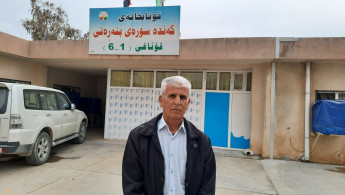Iraqi Kurdistan doctors, teachers, and garbage collectors go on strike over unpaid salaries
Public sector workers in the Iraqi Kurdistan region went on strike on Sunday over the Kurdistan Regional Government (KRG) not paying salaries in February, despite oil prices reaching record highs as a consequence of the Russian-Ukraine war.
Sulaimaniyah province saw a mass walkout by government workers over the issue of pay, with the KRG cutting salaries following a crash in oil prices in 2014.
Since then, the Kurdistan region has sold its oil independently of the federal government in Baghdad, exporting nearly 4,500 barrels of oil per day to international oil markets via Turkey with prices at a new high.
"The KRG has promised us to pay us every month on time, but the Kurdish authorities did not keep their word, and there are no hopes that the KRG will pay us the February salaries soon - thus we are obliged to boycott classes," Husamadin Mohammad Aziz, a 62-year-old primary school teacher in Sulaimaniyah told The New Arab.
"As we are going on strike, as a teacher, I am worried about the destiny of our pupils, but boycotting classes is the only thing that we can do to make the KRG pay us."
He said that according to Kurdish MPs, due to the high price of oil, the KRG has enough money to pay its civil servants but that Erbil was not being clear about how much income it is getting.
A woman employee in one of the KRG ministries has told The New Arab, on condition of anonymity, said she is going on strike over delayed and unpaid salaries and a halt in pay rises since 2014.
"Paying monthly salaries regularly on time is a basic right of the KRG civil servants," she said.
Public health workers also went on strike over unpaid salaries, with most government hospitals across Sulaimaniyah province suffering from dire medicine shortages.
The KRG is neither paying its healthcare employees nor private companies that have provided medicine to public hospitals.
It has also failed to pay subsidies to private companies tasked with collecting garbage, leading them to also go on strike.
The KRG has implemented strict austerity measures in 2014, including cutting off the public payroll by 21 percent, as well as halting annual pay rises, as the oil prices reached record lows and the KRG was engaged in the war against IS militants.
But now as Brent oil price is almost $118 per barrel, civil servants and Kurdish lawmakers have raised the question of why the KRG is not paying salaries and where the oil incomes are going.
The KRG, as well as the parliament, are dominated by the two main parties - the Kurdistan Democratic Party (KDP) and the Patriotic Union of Kurdistan (PUK).
The Change Movement is also a partner of the KRG and runs the ministries of finance, trade, and industry.
Omar Gulpi, an MP from the Kurdistan Justice Group opposition party and member in the regional parliament's finance committee accused the Kurdish political leadership of carrying out a "bad policy of administering revenues" and "taking over part of the incomes for their own partisan companies".
"We along with tens of other PMs have asked the KRG leadership to attend the parliament to make clarifications for us and the people over the incomes of oil, other local revenues from border gates, but the presidency of the parliament is blocking our efforts," Gulpi told The New Arab in a phone call.





 Follow the Middle East's top stories in English at The New Arab on Google News
Follow the Middle East's top stories in English at The New Arab on Google News


